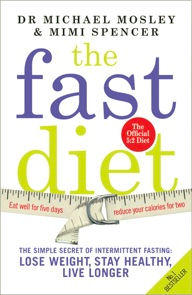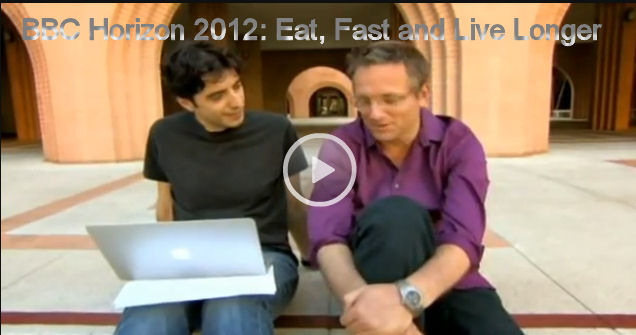Revolutionary ideas from beyond The Fast Diet
 The Fast Diet may actually have hit on a way to break people of industrialised countries from their habit of overeating and constantly craving food. It promotes the idea of eating normally five days out of seven. The other two days are non-consecutive days of fasting, when food consumption is kept very low. This is a kind of heresy in societies where people are constantly grazing and obesity is burgeoning. This article suggests that the revolt of the food-slaves may be just the beginning.
The Fast Diet may actually have hit on a way to break people of industrialised countries from their habit of overeating and constantly craving food. It promotes the idea of eating normally five days out of seven. The other two days are non-consecutive days of fasting, when food consumption is kept very low. This is a kind of heresy in societies where people are constantly grazing and obesity is burgeoning. This article suggests that the revolt of the food-slaves may be just the beginning.
Most dieters and the resigned obese will find a certain resonance in the idea that we of the industrialised world have been mis-educated to have an irrational fear of going without food even for one day. This book says that it is okay to hardly eat at all, or even just to drink water, for a day or two at a time. It helps that it is co-written with Mimi Spencer by Dr Michael Mosely, a medical doctor best known for his testing of new medical theories on the BBC. The book bases its theory on the premise that the lifestyle of humans in a more natural state was punctuated with famine as well as feasts. A BBC Horizons documentary preceded the creation of the book. (See further down for link to BBC video.)
Instead of the privations of dieting, this approach helps one to see fasting as a liberation from the chains of almost compulsory regular meals and between-meal grazing, furtive snacking and shameful binging. The book also questions the received wisdom on the importance of breakfasts.
For me this idea of fasting takes care of the intellectual problem of how overeaters might 'abstain' from overeating the way alcoholics abstain from drinking alcohol a day at a time in Alcoholics Anonymous. The Overeaters Anonymous approach suggests abstaining from bad eating habits, from your 'trigger foods', however this does not work very well when all food beyond a few raw or steamed vegetables may be your trigger, when just the act of eating brings on overeating.
Choosing to fast a couple of non-consecutive days a week seems to take care of that problem; you simply don't get started.
As with Alcoholics Anonymous, which promotes the idea that anyone can go without a drink just for one day, this book promotes the idea that anyone can go with an absolute minimum of food one day at a time. The idea is not to then cease to eat at all, but to happily return to one's old habits for the next three or four days, until the time comes for the second fasting day of that week.[1]
The book cites some fascinating scientific work which shows that fasting has many physiological benefits - on mice and men. It sounds almost too good to be true but this way of eating and not-eating can quickly drop blood pressure, cholesterol and raise insulin resistance as well as steadily drop weight. There are some even stronger claims which are well argued, but I will leave you to read the arguments in the book.
No less interesting, however, were the psychological benefits which people felt from being released of the need to overeat, a freedom which seemed to persist into those non-fasting days. Correspondence which the authors have received amounts over time to a social change in how those people deal with food.
Overeating as a symptom of our Growth and Consumerism prison
The book touches on the commercial pressures that shape our attitudes to food, but it focuses more on empowering us to shut these out with a focused approach to fasting.
I could not help but see that this attitude could be widened to liberate us from other persuasions of the consumerism and growth economy.
As with taking a day off from eating and cooking, I would like to suggest that people start to spend a couple of non-consecutive days a week not buying anything - actively abstaining from purchasing.
The principle behind this idea is that, as we are slaves to continuous impulsive grazing, we are also slaves to continuous impulsive purchasing of stuff.
Immediately stemming from reducing one's involvement with continuous eating and consumption of stuff, is a reduction in driving and shopping. Hours of time and energy can be saved from exhausting navigation of supermarket mazes trying to choose from competing displays, then unpacking everything and putting it away. Ditto for cooking complex meals day in and day out.
Stopping buying non-food 'stuff' which we then spend our lives trying to use or tidy away in ever more crowded lives and living spaces would bring similar benefits. More time, more space, more clarity. The fasting process would also reduce the need for a wardrobe of clothes in various sizes and styles to accommodate inconvenient fluctuations in girth. Thus we would not need to buy so many clothes or have such overstuffed wardrobes and drawers.
I am suggesting that overeating and overpurchasing are both responses to consumerism brainwashing.
Such two day a week stances present a new way of seizing our lives back from the remorseless growth economy.
With a total reduction in food consumption, animal liberationists would see a drop in the rate of killing and consumption of animals and environmentalists would see a reduction in the clearing of forests to grow crops. With the reduction in car-use and cooking and refrigeration we would see a reduction in fuel use.
The fasting and purchasing abstinence days could also be computer-sit-down and internet-free days, and active days, twice a week.
We could apply the same approach to stem the continuous tuning in to radio, television, apps and phones.
It's then easy to see how we might further reduce the amount of stuff our economies churn out and the amount of time we spend working. If we did this then our consumption of finite resources would drop, giving us more time to evolve our economies out of the trap they are marching us all into.
The marketeers would fight back of course. If people succeeded in liberating themselves two days a week from the consumer grind, the growth-lobby would simply try to import more people into industrialised countries, which it is currently doing. But perhaps, with those days we will have seized from the jaws of futile consumerism, we the people might return to community involvement and the associated politics and law, standing up to demand real democracy and against inflicted population and economic growth.
[1] Of course that doesn't work with addictions to alcohol and other drugs which affect dopamine release in the brain for longer periods than 24 hours. So if you are doing abstinence from drugs a day at a time, just keep on abstaining.

 Click here to see a video of the original BBC program where the research that led to the book was first aired by Michael Mosely.
Click here to see a video of the original BBC program where the research that led to the book was first aired by Michael Mosely.
Recent comments